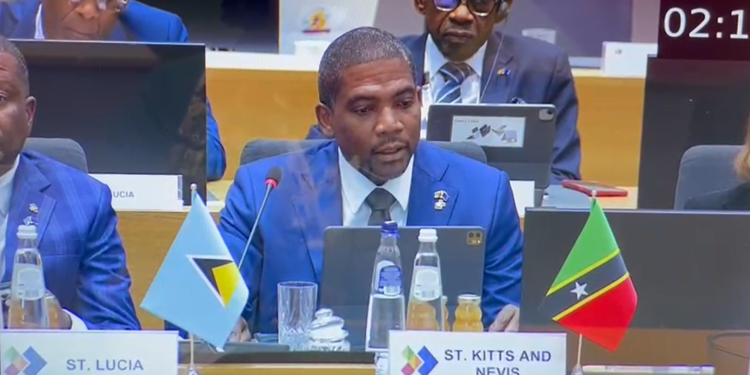BASSETERRE, St. Kitts, July 18, 2023 (SKNIS) – The Prime Minister of St. Kitts and Nevis, the Honourable Dr. Terrance Drew addressed the ongoing EU-CELAC Summit today, Tuesday, July 18, 2023, where he, among other things, called for greater multilateral cooperation to combat the challenging effects of climate change.
Being held in Brussels, Belgium, Prime Minister Dr. Drew said the EU-CELAC Summit comes at a time “when the world is grappling with the existential threat of climate change.”
“None of us is left untouched by its devastating effects. Each country must therefore chart its unique course in responding to this crisis and prioritize multilateral cooperation to effectively navigate the global web of climate finance, policy, ambition, and action in addressing the climate crisis,” the Prime Minister said.
The Honourable Dr. Terrance Drew assured the world leaders that his administration is doing all that is necessary to transform St. Kitts and Nevis into a country that is climate resilient.
He said, “To combat our existential threats and ensure a just transition, Saint Kitts and Nevis, the smallest nation in the Western Hemisphere, is committed to climate resilience, geothermal-based energy security, food security, expanded social protection and finding innovative ways of uprooting systemic poverty as well as the increasing national security threats which are indirectly linked to failing livelihoods caused by the climate crisis, thus we have developed an agenda called the Sustainable Island State Agenda.”
To achieve these goals, however, Prime Minister Dr. Drew said there is a greater need for access to funding, and as such, reiterated his government’s support of the innovative approaches which the Bridgetown Initiative advocates.
“Given the urgent need for adequate capital to address development goals, climate impacts, adaptation, mitigation and resilience building, genuine reform of the global financial architecture is critical,” said Dr. Drew.
The Bridgetown Initiative is essentially a three-step proposal that seeks to reform the world of development finance, particularly looking at how wealthier nations can help small island developing states cope with and adapt to climate change.
The three steps outlined in the Bridgetown Initiative are step one – provision of emergency liquidity to stop the debt crisis in its tracks; step two – expanding multilateral lending to Governments by US$1 trillion, and step three – activate private sector savings for climate mitigation and fund reconstruction after a climate disaster through new multilateral mechanisms.









